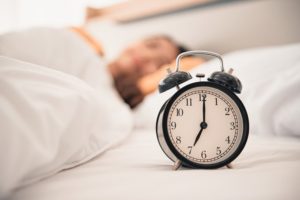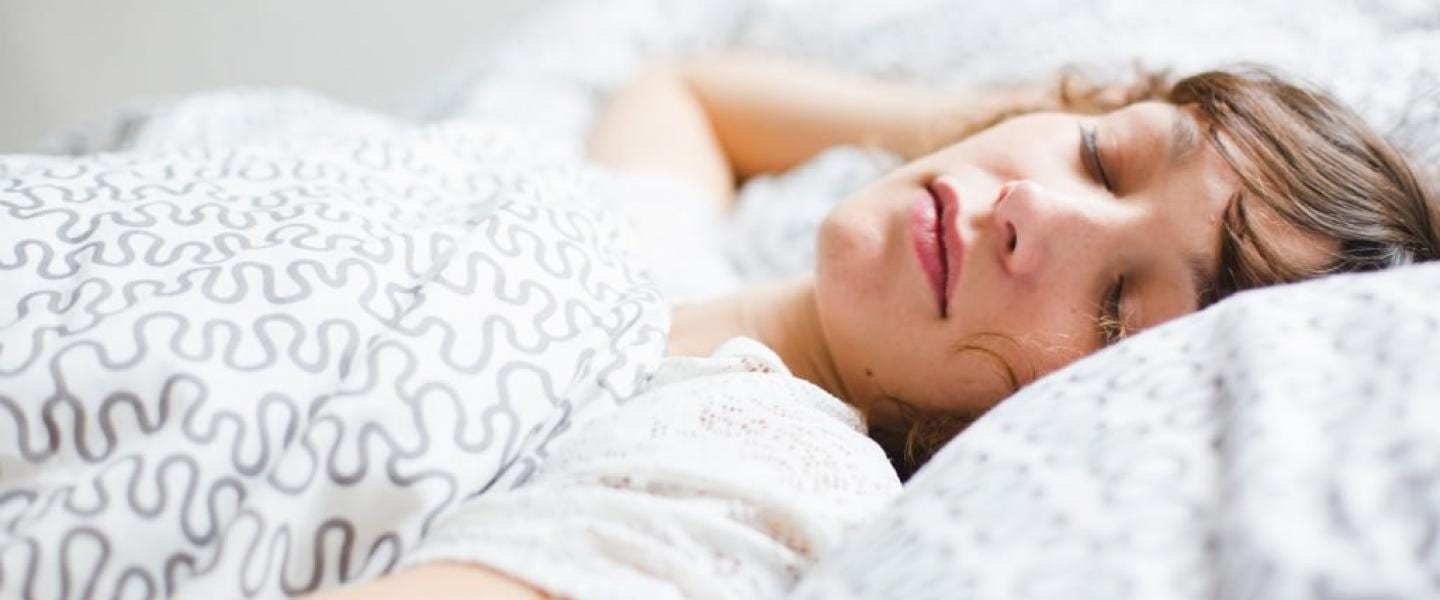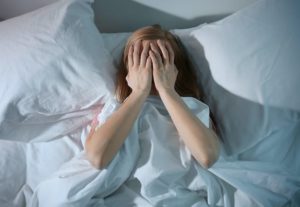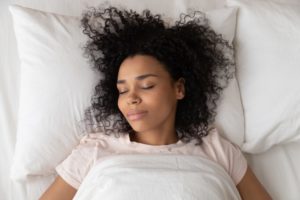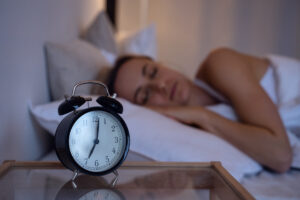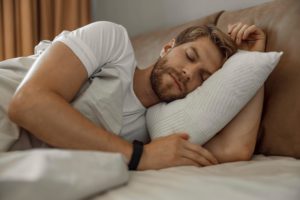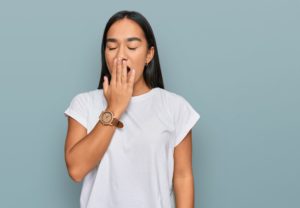How Your Body Uses Calories While You Sleep
Many people are surprised to discover how many calories we burn while sleeping. Although sleeping requires far less energy than most daytime activities, it’s still an active period for our brain and certain other bodily functions.
The exact number of calories burned sleeping depends on a complex interplay between sleep, diet, exercise, and other variables. If you are having trouble with weight management or energy levels, an understanding of the factors that influence metabolism may help you regain control of your health.
How Many Calories Do You Burn While You Sleep?
As a very approximate number, we burn around 50 calories an hour while we sleep. However, every person burns a different amount of calories during sleep, depending on their personal basal metabolic rate (BMR).
The basal metabolic rate refers to the energy needed for essential functions such as breathing, circulation, temperature regulation, and cellular growth and repair. In most people, the basal metabolic rate accounts for approximately 80% of the total calories burned in a day. The brain itself burns glucose for energy, accounting for about 20% of the calories we consume while at rest.
What Factors Affect the Basal Metabolic Rate?
The basal metabolic rate varies from person to person depending on a number of factors, only some of which can be changed:
- Height and Weight: The larger a person’s body, the more calories it requires to function.
- Fitness: Muscle burns more calories than fat, so people who are fit and regularly active burn more calories, even while at rest.
- Gender: Men generally have a higher BMR .
- Age: Growing children have a higher metabolism, but metabolic needs decrease as we age.
- Diet: Sticking to a healthy diet can help manage body fat composition.
- Sleep Quality: Poor sleep quality and insufficient sleep have a detrimental effect on metabolism.
- Race: Some studies show that African-Americans may have a naturally lower BMR.
- Genetics. Genetics may influence metabolism to some extent.
- Hormones and Medical Conditions: Pregnancy, lactation, menopause, hypothyroidism or hyperthyroidism, and other conditions can raise or lower the basal metabolic rate. Consult your doctor if you believe an underlying condition could be affecting your metabolism.
How To Calculate Your Calories Burned While Asleep
Calculating your precise basal metabolic rate requires the use of a calorimeter . A calorimeter measures the amount of energy you are consuming by analyzing the oxygen and carbon dioxide being inhaled and expelled from your body.
Usually, people who want to get the most accurate reading of their basal metabolic rate will spend the night in a laboratory, abstain from exercise for 24 hours, fast for 12 hours, and sleep for at least 8 hours prior to the reading. These details are important because digestion and exercise are energy-hungry processes that cause spikes in metabolism. The measurements are then carried out in the morning in a darkened, temperature-controlled setting.
Due to the expensive and complex nature of this test, it’s not practical for the average person to get one done. However, you can get a rough idea of your basal metabolic rate by using one of several equations. One of the most common is the Harris-Benedict equation , which is based on weight, height, age, and gender:
Male: BMR = 66.5 + (13.8 x weight in kg) + (5 x height in cm) – (6.8 x age in years)
Female: BMR = 655 + (9.6 x weight in kg) + (1.8 x height in cm) – (4.7 x age in years)
The result gives you your basal metabolic rate while awake over a 24-hour-period. To calculate approximately how many calories you burn per hour of sleep, divide the number by 24 to get the hourly rate, then multiply by 0.85 to account for the lower metabolic rate during sleep.
Although it differentiates between men and women, the Harris-Benedict equation does not factor in genetics, race, hormones, muscle-to-fat ratio, or medical conditions. To get a rough idea of your muscle-to-fat ratio, you can calculate your Harris-Benedict equation (BMI):
BMI = weight (lbs) / [height (in)]2 x 703
A BMI under 18.5 is considered underweight, and a BMI over 25 is considered overweight. However, for Asian or Asian American ethnicity, BMI over 22.9 is considered overweight. Generally, overweight people have a higher proportion of fat, which burns fewer calories than muscle. Please note, this BMI formula may not be accurate for pregnant women, bodybuilders, or other people who have an atypical body composition.
Do Sleep Stages Affect Calories?
Not all sleep stages burn the same amount of calories. While basic functions such as breathing and circulation continue throughout the night, the body’s energy requirements ebb and flow.
The most energy-intensive sleep stage is rapid eye movement (REM) sleep. During REM sleep, our heart rate increases and our brain exhibits activity patterns similar to daytime levels. The heightened brain activity requires more glucose, leading to a higher metabolism.
By contrast, in stage three “deep” sleep, heart rate, respiration, core body temperature, and brain activity dwindle to a minimum. This is when the growth hormone is released, and it’s thought that stage three sleep plays an important role in the immune system. However, the brain requires less glucose during stage three sleep, so metabolism tends to be at its lowest.

Can You Increase the Number of Calories You Burn During Sleep?
To increase the number of calories you burn during sleep, you would need to increase your basal metabolic rate. The easiest way to do this is by eating right, getting enough exercise, and sleeping well.
Since we burn more calories when awake, it’s not surprising that skipping one night of sleep causes us to temporarily burn more calories . However, in the long term, substantial research has shown that a chronic lack of sleep is linked to obesity.
A lack of sleep causes surges in hormone that make you crave high-calorie foods. Sleep loss also raises cortisol levels, which affects your body’s ability to regulate glucose and may contribute to weight gain, insulin resistance, and even type 2 diabetes. And while the extra time awake may result in more calories being burned, restricting calories while sleep-deprived leads to the body burning lean mass instead of fat.
Given that the brain burns more calories during REM sleep, sleep interruptions that affect the time spent in this stage can have an impact on the calories you burn. Adopting proper sleep hygiene habits and creating a cool, dark, quiet bedroom environment can encourage your body to cycle naturally through the sleep stages and optimize your metabolism while sleeping.
The link between sound sleep and metabolism is clearly shown in people with obstructive sleep apnea (OSA), a sleep disorder that causes fragmented sleep due to repeated lapses in breathing. Obesity and OSA often go hand-in-hand, suggesting that one condition may exacerbate the other.
Exercise, Diet, and Sleep
Some studies have found that eating too close to bedtime can lead to weight gain, though a more important factor seems to be the type of food you eat. If you feel compelled to indulge in a midnight snack, stay away from junk food, and opt for a light and healthy snack instead. As a bonus, a healthier diet, in turn, improves sleep quality .
Regular exercise and a healthy diet can help you regularize your sleep schedule, improve your muscle-to-fat ratio, and boost your metabolism. Avoid drinking caffeine and alcohol before bed. While caffeine does cause a temporary spike in metabolism, it interferes with sleep and is not an effective weight-loss strategy.

Still have questions? Ask our community!
Join our Sleep Care Community — a trusted hub of product specialists, sleep health professionals, and people just like you. Whether you’re searching for the perfect mattress or need expert sleep advice, we’ve got you covered. Get personalized guidance from the experts who know sleep best.
References
12 Sources
-
Burning calories without exercise. Harvard Health. (2021, February 15).
https://www.health.harvard.edu/staying-healthy/burning-calories-without-exercise -
McMurray, R. G., Soares, J., Caspersen, C. J., & McCurdy, T. (2014). Examining variations of resting metabolic rate of adults: a public health perspective. Medicine and science in sports and exercise, 46(7), 1352–1358.
https://pubmed.ncbi.nlm.nih.gov/24300125/ -
Sharma, S., & Kavuru, M. (2010). Sleep and metabolism: an overview. International journal of endocrinology, 2010, 270832.
https://pubmed.ncbi.nlm.nih.gov/20811596/ -
Mergenthaler, P., Lindauer, U., Dienel, G. A., & Meisel, A. (2013). Sugar for the brain: the role of glucose in physiological and pathological brain function. Trends in neurosciences, 36(10), 587–597.
https://pubmed.ncbi.nlm.nih.gov/23968694/ -
Buchholz, A. C., Rafii, M., & Pencharz, P. B. (2001). Is resting metabolic rate different between men and women?. The British journal of nutrition, 86(6), 641–646.
https://www.cambridge.org/core/product/identifier/S0007114501002379/type/journal_article -
Wang, X., Sparks, J. R., Bowyer, K. P., & Youngstedt, S. D. (2018). Influence of sleep restriction on weight loss outcomes associated with caloric restriction. Sleep, 41(5), 10.1093/sleep/zsy027.
https://pubmed.ncbi.nlm.nih.gov/29438540/ -
Willis, E. A., Herrmann, S. D., Ptomey, L. T., Honas, J. J., Bessmer, C. T., Donnelly, J. E., & Washburn, R. A. (2016). Predicting resting energy expenditure in young adults. Obesity research & clinical practice, 10(3), 304–314.
https://pubmed.ncbi.nlm.nih.gov/26210376/ -
All About Adult BMI. (2020, September). Centers for Disease Control and Prevention.
https://www.cdc.gov/healthyweight/assessing/bmi/adult_bmi/index.html -
Jung, C. M., Melanson, E. L., Frydendall, E. J., Perreault, L., Eckel, R. H., & Wright, K. P. (2011). Energy expenditure during sleep, sleep deprivation and sleep following sleep deprivation in adult humans. The Journal of physiology, 589(Pt 1), 235–244.
https://pubmed.ncbi.nlm.nih.gov/21059762/ -
Cappuccio, F. P., D’Elia, L., Strazzullo, P., & Miller, M. A. (2010). Sleep duration and all-cause mortality: a systematic review and meta-analysis of prospective studies. Sleep, 33(5), 585–592.
https://www.ncbi.nlm.nih.gov/pubmed/20469800 -
Baron, K. G., Reid, K. J., Kern, A. S., & Zee, P. C. (2011). Role of sleep timing in caloric intake and BMI. Obesity (Silver Spring, Md.), 19(7), 1374–1381.
http://doi.wiley.com/10.1038/oby.2011.100 -
Knowlden, A. P., Burns, M., Harcrow, A., & Shewmake, M. E. (2016). Cross-sectional analysis of food choice frequency, sleep confounding beverages, and psychological distress predictors of sleep quality. International journal of adolescent medicine and health, 30(1), /j/ijamh.2018.30.issue-1/ijamh-2015-0120/ijamh-2015-0120.xml.
https://www.degruyter.com/document/doi/10.1515/ijamh-2015-0120/html


